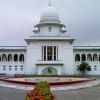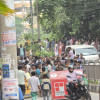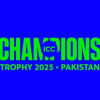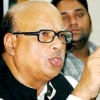Doctor or not? BMDC’s contested call on medical assistants

The Bangladesh Medical and Dental Council (BMDC) has landed in hot waters following its recent decision to grant medical assistants the status of "Registered Diploma Medical Practitioner". This new decision allows medical assistants to use the prefix of "Doctor" or "Dr" before their names and practice independently, a move that has led to strong reactions from the medical community.
Medical students, doctors, and healthcare experts are voicing deep concerns about the implications of this decision. They believe that this dilutes the uncompromising standards and qualifications traditionally required to earn the title of a doctor, potentially undermining the credibility of the healthcare system.
The MBBS – Bachelor of Medicine, Bachelor of Surgery – and BDS – Bachelor of Dental Surgery – degrees, which require extensive academic training, internships, and examinations, have long been considered the gold standard for medical practice. The Diploma in Medical Faculty (DMF) offered through Medical Assistant Training Schools (MATS), while valuable, does not provide the same level of comprehensive clinical and diagnostic skills. Many fear that allowing medical assistants to practise independently could lead to an increase in unqualified practice, posing a risk to public health.
Eligibility for MATS requires a minimum GPA of 2.5 in SSC or an equivalent exam, with the Biology subject from the Science group, and does not even require passing HSC. In stark contrast, applying for an MBBS or BDS degree demands a combined GPA of at least 9.00 from both SSC and HSC, including a minimum GPA of 4.0 in Biology; without meeting these criteria, applicants are ineligible.
"I strongly oppose BMDC's decision to grant medical assistants the title of doctor. This totally undermines the gruelling path to becoming a physician and jeopardises patient safety by enabling unqualified practice. We must protect the integrity of the medical profession and ensure that only MBBS and BDS graduated doctors can provide independent care," says Sharif Mohammed Sadat, a final-year student at Bangladesh Medical College.
Some even suggest there's an ulterior motive behind this schism.
"The accomplices of the previous autocratic regime have orchestrated this drama to paralyse the medical sector and discredit the new interim government. The time has come to bring sweeping changes to all institutions," says Saif Ali, a third-year student at Shaheed Suhrawardy Medical College.
Almost everyone in the medical and healthcare sector is disgruntled over the situation. The Anti-Discrimination Students Movement (Medical and Dental Unit) has called on all medical students, doctors, and concerned citizens to join the "Long March to BMDC" on August 21, demanding an immediate reversal of the decision. Organisations like the Bangladesh Medical Students' Society (BMSS) have expressed their solidarity from the outset.
Although BMDC issued a statement on August 20 affirming that only MBBS/BDS degree holders can claim the title of doctor, the issue is far from resolved. In addition to calling for an immediate reversal of the BMDC's decision, medical and dental students, along with practising doctors, are advocating for a robust government crackdown on quackery to eliminate unauthorised and unsafe medical practices. They also emphasise that the white coat, a symbol of medical integrity and professionalism, should be exclusively reserved for those who have earned MBBS or BDS degrees.
Furthermore, they demand precise role definitions, ensuring that medical assistants and allied health professionals operate strictly within their prescribed scopes, always under the supervision of fully qualified doctors. They also emphasise that specialised procedures, such as ultrasonography, should remain the purview of fully trained doctors.
"I think the issuing of the statement by BMDC regarding the ongoing situation is commendable but it is the first of many steps BMDC can take as it is the official regulatory body for medicos in Bangladesh. BMDC can gather opinions of medical and dental doctors regarding their rights, can help them formulate their demands in a memorandum and can present it to the officials in charge at the Ministry of Health. Also BMDC should include medical professionals in the policy making about their rights and responsibilities," says S M Tahmidul Alam, a final-year student at Dhaka Medical College.
"A doctor and a medical assistant can never be the same. They are graduates, while we only have a diploma. Their knowledge far exceeds ours. We are Diploma Medical Practitioners. For the past 15 years, the recruitment of Sub Assistant Community Medical Officers (SACMO) has been withheld. We're not provided with updated drug lists or opportunities for higher education and training. Despite these challenges, I believe we play a pivotal role in providing healthcare to marginalised and rural communities. We do not deserve to be looked down upon," says Abdullah Afzal Hossain, a graduate from Bagerhat Government Medical Assistant Training School.
Maintaining a clear distinction between MBBS/BDS doctors and other health professionals, such as medical assistants, is vital for preserving public trust and professional integrity. Elevating medical assistants to a similar status diminishes the significance of MBBS and BDS qualifications and enervates the credibility of the medical profession. Moreover, medical assistants are trained to assist doctors, not substitute them. Allowing them to take on responsibilities beyond their expertise - like performing diagnostic procedures or managing hospitals - imperils care quality, increases the risk of misdiagnoses, and threatens patient safety.

 For all latest news, follow The Daily Star's Google News channel.
For all latest news, follow The Daily Star's Google News channel. 








Comments